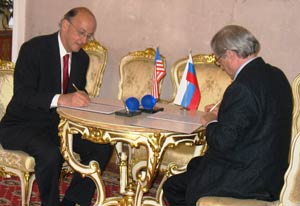Moscow talks further US-Russia scientific collaboration
May / June 2011 | Volume 10, Issue 3

Photo by Dr. Susan Shurin/NHLBI
An agreement establishing the forum was
signed in Moscow by Fogarty Director
Dr. Roger I. Glass and Vice-President of the
Russian Academy of Sciences Anatoly Grigoriev.
Moscow was the setting for two significant global health events this spring. The first was a planning meeting for the U.S.-Russia Scientific Forum, followed by the First Global Ministerial Conference on Healthy Lifestyles and Noncommunicable Disease Control.
The Scientific Forum will promote and facilitate broader research collaboration in the biomedical and behavioral sciences between the U.S. and Russian scientific communities, with the goal of improving public health. The focus of the joint research activities will be disease control, treatment and prevention, clinical and translational research, regulatory science and the development of new health technologies.
An agreement establishing the forum was signed by Fogarty Director Dr. Roger I. Glass and Professor Anatoly Grigoriev, vice-president of the Russian Academy of Sciences (RAS). The first session of the ongoing Forum is scheduled for November 16-18, 2011 in Moscow.
"We are excited to develop a joint research agenda based on common interests that will stimulate U.S.-Russian scientific collaborations and generate discoveries to improve the health of people everywhere," said Dr. Glass. "By encouraging the free flow of information we hope to share best practices in biomedical research and speed the process of discovery."
Said Grigoriev: "We anticipate that the Forum will emerge as a medium that links together the best intellectual powers strongly committed to make life better."
The planning meeting was facilitated by the Foundation for the National Institutes of Health (FNIH), in partnership with NIH, the Institute of Medicine and the Russian Academy of Sciences of the Russian Federation. FNIH established the Forum with a $1.27 million gift from Eli Lilly and Company as the founding private partner.
FNIH has engaged with a wide range of American and Russian-based companies - including many leading pharmaceutical firms - interested in broader bilateral collaboration in behavioral and biomedical research.
WHO report on NCDs released at ministerial conference
WHO and the Russian Federation organized the Ministerial Conference in order to raise political awareness and commitment on the prevention and control of noncommunicable diseases and to strengthen international cooperation in the run-up to the U.N. summit on NCDs in September.

Photo by Yuri Kozyrev/World Bank
The U.S.-Russia Scientific Forum will develop
a joint research agenda to improve health
in both countries.
The first WHO Global Status Report on NCDs said that chronic diseases accounted for 63 percent of the 57 million deaths worldwide in 2008.
Diabetes, heart disease and cancer cause more deaths worldwide than all other diseases combined, according to a WHO report. This is true even in developing countries, where communicable diseases such as malaria and HIV/AIDS are now surpassed by NCDs in every region except Africa.
"The good news is that these diseases are preventable," said WHO Director-General Margaret Chan. "People don’t have to suffer... don’t have to die." Her top targets are tobacco, sugar, fat and salt, followed closely by alcohol. NCDs, she said, place a huge economic burden on families and low- and middle-income countries in particular.
If no action is taken, WHO predicts that chronic diseases will rise by 15 percent worldwide in the next decade, with Africa, the Middle East and Southeast Asia to be hit the hardest.
More Information
To view Adobe PDF files,
download current, free accessible plug-ins from Adobe's website.